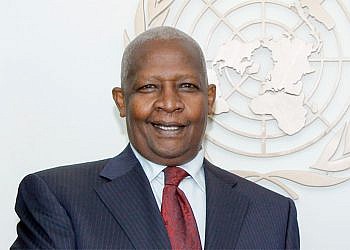The Uganda government has together with the United Nations System in Uganda have launched the Joint Programme for Data and Statistics (JPDS) in Uganda.
The $41 million joint programme implemented by the Uganda Bureau of Statistics (UBOS) and 12 UN entities in Uganda is anchored on Uganda’s NDP III, the United Nations Sustainable Development Cooperation Framework (UNSDCF) 2021-2025 and the Third Plan for National Statistical Development (PNSD III) 2020/21-2024/25.
The programme is a strategic instrument to create catalytic change in the improvement of the quality, relevance and use of SDG data and statistics in Uganda consistent with international human rights and gender equality norms and principles.
The joint programme aims at improving the capacity of the National Statistical System to produce, disseminate and use data and statistics.
While launching the joint programme, First Deputy Prime Minister, Rebecca Kadaga said the program comes at the right time.
“As a country, we are at that critical take-off stage where we must continuously and simultaneously plan ahead, reflect on progress and weigh the options on the best way forward towards sustainable social and economic development across all sectors. For instance, we are implementing a broad based program like the Parish Development Model (PDM) whose main focus is to bring all citizens into the money economy by transforming a largely subsistence sector into a modern commercial economy,” Kadaga said.
“ We are convinced so not only because we have the unexploited resources but because we have the resolve, capacity and opportunity to use evidence through collecting and harnessing data to augment all our decision making at all levels. That is just a clue on the important role statistics has in shaping the future of Uganda and Africa at large. “
Kadaga said the importance of statistics in the country cannot be overstated.
“The state of awareness of the importance that statistics plays in the economy is very high, the demand for it is high, expectations are high and we in government are best helped in the management of the scramble for the scarce resources when availed with up to date statistical indicators. We therefore cannot wait longer to have the outcomes of this program to support us manage the equitable allocation of resources and informing evidence based policy and decision making.”
UBOS Executive Director, Dr. Chris Mukiza said the joint programme will help close several gaps that have persistently affected Uganda’s data ecosystem .
“It will close gaps including lack of baseline information for some SDG indicators, slow pace of producing data series from administrative sources, limited technical skills for compilation of new SDG indicators and harnessing data from non-traditional sources; inadequate financial resources to procure requisite equipment for data collection and analysis and inadequate human resources,” Mukiza said.
“In particular, this program will help us to create public awareness on the various data and statistical programs, disseminate the findings of the status review of data and statistics in Uganda , re-affirm the critical role of data and statistics in tracking and accelerating progress on SDGs in Uganda and consolidate existing and build new partnerships along the statistics value chain.”
The UN Resident Coordinator in Uganda, Susan Namondo described the program as a new chapter in bring together synergies.
“The launch a celebration of a new approach. Several UN agencies were supporting the Government on data and statistics, but this was in a fragmented way, so a lot of synergies remained untapped. The new approach would augment the good work already happening.”










































